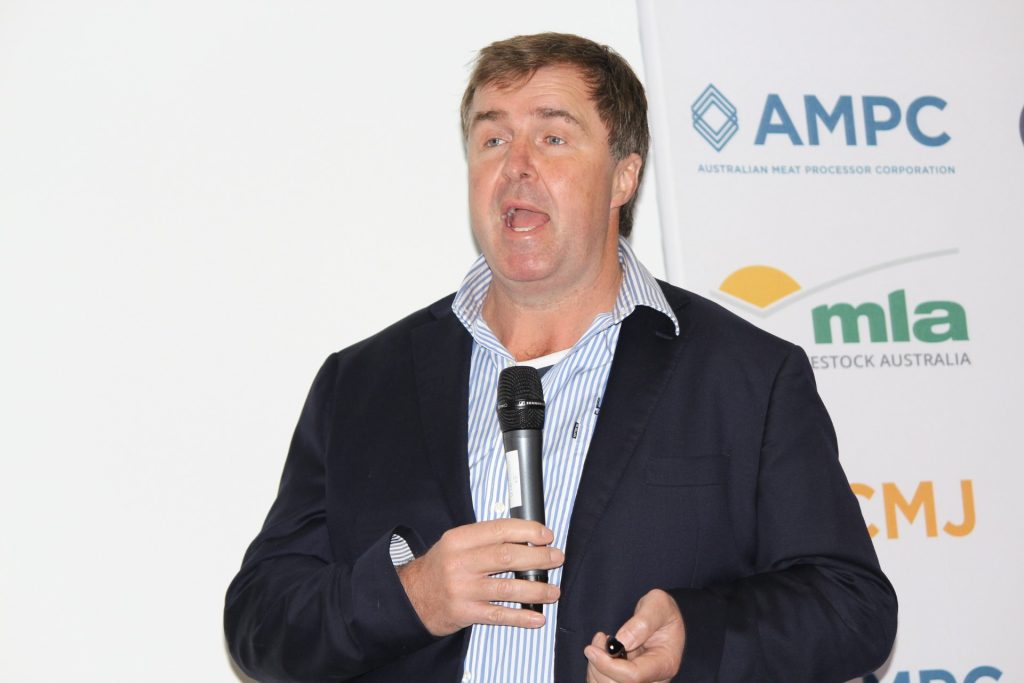
NSW sheep breeder Tom Bull at the ICMJ Conference in Wagga Wagga last week.
YOUNG red meat industry stakeholders were told to treat tradition as an opportunity, at the 2022 Intercollegiate Meat Judging Association Conference in New South Wales last week.
At Charles Sturt University’s Wagga Wagga campus, NSW prime lamb seedstock producer Tom Bull described how he moved on from industry tradition to succeed.
He said the sheep industry in the 1990s was subjective, “the show was king.”
The key for most breeders was trying to win a bit of felt and the whole industry was trying to win this bit of felt at a show and that’s how it went.
“It was all purebred, very wool focused, lamb was a by-product and at that time lamb was declining in popularity, it was too fat, eye muscles were too small … and consumption per capita was really declining.”
Mr Bull said one of the most influential people on his career was a former Ingham’s Chicken employee who explained how the business was based on producing a meal for two at two different price points.
“And then they would work back and find out what genetics and what feed they would need.
“Everything we have done since is trying to do that,” he said.
He said he look at the sheep stud industry and thought: “The best thing about the stud industry is they won’t change.”
“They are still going to show sheep, the average stud breeder is about 70 years of age,” he said.
“So then all of a sudden, really our business was based about looking at the opportunity.
“So what was the first one: use of objective data, performance recording data,” he said.
“We were one of the first people in Lambplan in 1994 and using data, and that was not the done thing, ‘it’s all about the eye, 50 years trying to train your eye how to pick a sheep’.
“The other one that really came up was to use composite sheep, again not the done thing – ‘purebred sheep, you can’t taint the breed, you can’t register them with your breed society’,” he said.
Mr Bull said he applied ‘Apple thinking’ – “people don’t know what they need, I didn’t know I needed an iPhone”.
“It was really that Apple thinking, trying to think ahead, trying to work what people need and I think that’s really where our opportunities (are) – performance recording, self-replacing flocks.
“You could see the whole Australian lamb industry was based on Merino sheep, because we were wool-focused, wool is king,” he said.
“So really all we tried to do was go, ‘why not have specialist meat flocks?
“We used to say why not have the Angus cow of the Australian lamb industry?
Mr Bull said seven breeds were put together to develop the Primeline Maternal.
“Every agent, every buyer was saying ‘No, you can’t do that’.
“Within five years we broke the Australian ram sales record selling composite rams, and as lambs, half the age of the other fellows,” he said.
“So I think when I look at the industry, tradition is what got me ahead.
“As young people, see that as an opportunity, don’t see that as a threat,” he said.
“The tradition of the industry is what enabled us to actually grow.”
Mr Bull said the beef sector had applied IBISWorld founder Phil Ruthven’s message at a Holbrook Meat Profit day in 2000 that ‘the meat industry needed to become a wine industry.’
“You need provenance, you need point of difference.
“What actually happened we saw the beef industry take that up … brands emerged, certified Angus beef, the Wagyu juggernaut was just starting to roll and then you look at what’s happened since that time,” he said.
“The whole industry’s been painted black based on one thing – eating quality.
“The beef industry is about brands now.”
He is favourite beef brand is Rangers Valley WX5.
“I know how it will eat it eats the same every time.”
But Mr Bull said lamb is still “just lamb.”
“We’re where beef was 20-something years ago, but lamb is just lamb, there is no point of difference, some eats good, some eats bad.
“But what do you reckon my next opportunity is? Eating quality.”
Mr Bull said looking at intramuscular fat, with an Australian average of 4.2pc,
Use your time wisely
The 46 year-old Lampro principal who said he still thinks he is 20, advised his audience to use their time wisely.
“One minute you are thinking, you know, worrying about bar night and the next minutes you’ve got kids and farms and everything else.”
His first job after his University of Sydney degree was working in the boning room of an American company Superior Farms trying to substitute US lamb with Australian product.
“It was great because I actually understood about meat, it was probably one of the best things I ever did.”
After Superior Farms left Australia, he stayed in the processing sector and was involved with the Viascan technology that measured the meat yield of carcases. He eventually became the marketing manager for Australia and New Zealand.
“As it happened, New Zealand took it up and Australia to a limited degree.”
He then headed home and briefly had a business processing his own wool into doonas, eventually marketing them nationwide through Grace Bros. (now Myers).
“It was really good experience, learnt a lot, lost a lot of money, learned a lot about Underbelly One because all the people I had to deal with I felt were Mafia in Melbourne.”
Mr Bull said he started Lambpro with five stud ewes in 1991 and now he runs 10,500 sheep and will sell 4000 rams this year.
“And 1.1 million or nearly 5 percent of Australia’s lambs are now sired by our rams that come off our farm.”

HAVE YOUR SAY